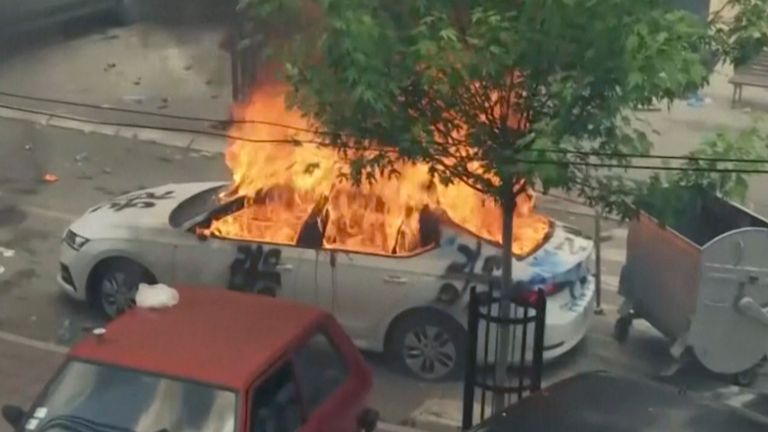NATO will deploy an extra 700 troops to Kosovo amid rising tensions with ethnic Serbs.
An additional battalion of reserve forces have also been put on high alert to be deployed if needed, NATO secretary-general Jens Stoltenberg has said.
He said attacks in Kosovo “must stop”.
Mr Stoltenberg warned that NATO troops “will take all necessary actions to maintain a safe and secure environment for all citizens in Kosovo.”
He urged both sides to take steps to deescalate, refrain from “further irresponsible behaviour,” and to return to EU-backed talks on improving relations.
On Monday, 30 NATO soldiers were hurt in clashes with ethnic Serbs, as well as some 50 protesters.
Explainer: Why have tensions flared up between Serbia and Kosovo?
Kosovo is a former province of Serbia which declared independence in 2008 – but Belgrade does not recognise its independence.
Ethnic Albanians make up most of the population, but Kosovo has a Serb minority in the north of the country bordering Serbia.
Earlier today Serb protestors smashed two cars belonging to Albanian journalists in the town of Leposavic.
Masked men approached a car with an Albanian number plate marked as “A2, CNN affiliate” and smashed the windscreen.
Another car belonging to another media outlet was smashed as well. No one was injured.
Tensions first increased over the past weekend, after ethnic Albanian officials elected in votes overwhelmingly boycotted by Serbs entered municipal buildings.
When the Serbs tried to block them, Kosovo police fired tear gas to disperse the crowd.
In response, Serbia put the country’s military on the highest state of alert and sent more troops to the border with Kosovo.
The Serbs protested again on Monday, insisting both ethnic Albanian mayors and Kosovo police must leave northern Kosovo.
The confrontations worsened when Serbs attempted to enter the municipal offices in Zvecan, 28 miles north of the capital Pristina.
They clashed first with Kosovo police and then with the international peacekeepers who deployed in Zvecan.
The flare-up has triggered a flurry of international efforts to calm the situation.
The US and most European Union nations have recognised Kosovo’s independence from Serbia while Russia and China have sided with Belgrade.
Earlier today China expressed its support for Serbia’s efforts to “safeguard its sovereignty and territorial integrity” and Moscow has repeatedly criticised Western policies in the dispute.
This story originally appeared on Skynews


